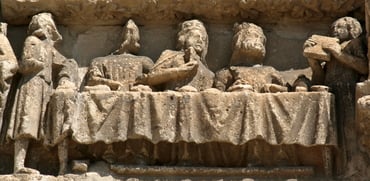Explanation of Genesis 19:3
Nga Brian David

This verse shows what happens if we persevere when facing temptation, and continue seeking the Lord’s help: The Lord will be with us, will see and empower the good in us, will stay with us and purify us, and will let us feel that good as our own. That’s a rather beautiful picture, and indeed, is the whole reason the Lord lets us face temptation in the first place.
Lot represents a remnant of the Ancient Church that still retained a desire to be good and love others. Facing tempation in the previous verse, that remnant here perseveres, and is granted the Lord’s mercy. The house represents the remnant’s in inmost desire for good; the food of the feast the energy and will to do what is good; and the unleavened bread represents that good being purified, with evil desires taken away. Finally, eating represents the remnant being allowed to make that desire for good their own.
(Referencat: Arcana Coelestia 2337, 2338, 2343)
Arcana Coelestia #3607
3607. 'The days of mourning for my father are approaching, and I will kill Jacob my brother' means an inversion, and the removal from truth of the life from itself. This is clear from the meaning of 'the days of mourning' as an inversion of state, and from the meaning of 'killing his brother Jacob' as removing from truth the life from itself. These matters are similar to those discussed just above about hatred not being meant in the internal sense by 'hatred'. The same is also evident from things that are happening all the time in the next life. In that life all good flowing down from heaven to those under the influence of evil is converted into that which is evil, and among those in hell into that which is an opposite of that good; and truth in a similar way is converted into falsity, see 2123. Conversely therefore, that which exists as evil and falsity among such evil spirits as these exists in heaven as good and truth; and to turn this into what is good, there are spirits along the way who remove ideas of evil and falsity so that an idea of good and truth may present itself. Concerning that removal, see 1393, 1875. Furthermore when evil and falsity reach people with whom good and truth are present they are not seen as evil and falsity but under some other form determined by the disposition and state of the goodness that exists with them.
[2] From this it may also be seen that 'killing Jacob his brother' does not mean in the internal sense killing but the removal of that life which does not properly belong to truth. For of itself truth has no life except from good, truth being merely a vessel for receiving good, see 1496, 1832, 1900, 2063, 2261, 2269, 2697, 3049, 3068, 3128, 3146, 3318, 3387. It is in good that life lies, but not in truth unless it receives it from good 1589, and many other paragraphs. Consequently the removal from truth of the life from itself does not destroy truth but gives it life, for when truth seems to possess life from itself it does not possess any life at all other than that which is not life in itself. But when that life from itself is removed, life itself is then conferred on it, that is to say, the life received by way of good from the Lord, who is life itself.
[3] This is plain to see in those in the next life with whom truth alone exists. Their ideas appear closed, so much so that things of heaven are unable to flow in except in so general a way that it is scarcely recognized as being influx from that source. But the ideas of those with whom good as well as truth exists appear to be open, so much so that things of heaven flow so to speak into a miniature heaven or an image of themselves, for such things flow by way of the good present with those persons into the truths, see 1869, 2429. The fact that truth has the life from itself removed from it when good starts to occupy the prior position or to have dominion may be seen from what has been stated and shown already about the apparent priority of truth in the first stage and about the priority of good later on. It is this removal from truth of life from itself that is meant here. The reason why these matters are referred to as 'mourning for a father' is that 'the days of mourning' means an inversion of state, the inversion of state that was meant above in verse 33 by Isaac's 'trembling very greatly', 3593, and in verse 34 by Esau's crying out 'with a loud and bitter cry', 3597.






